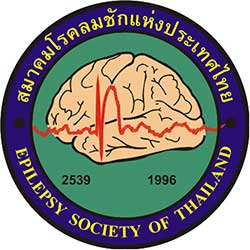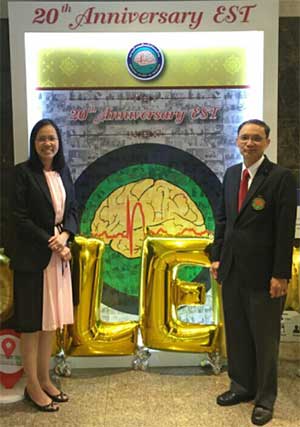Epigraph Vol. 18 Issue 2, Fall 2016
Celebrating the 20th Anniversary of the Thai Epilepsy Society

The Epilepsy Society of Thailand (EST) was established on May 22, 1996 by a small group of physicians who shared a common interest in epilepsy. The main objectives of this organization were to improve the standard of care for people with epilepsy, to improve the quality of treatment for epilepsy, and to provide up-to-date knowledge to general practitioners and patients. The principal founder of the society, Professor Pongsakdi Visudhiphan was the first president of EST. He and the General Secretary, Dr. Somchai Towanabut, labored diligently to enable Thailand to become a chapter of the ILAE one year after the establishment of the Society.
The EST was formally announced as the Thailand Chapter of ILAE in Dublin, Ireland during the 22nd International Epilepsy Congress in 1997. After the establishment of the EST, Professor Pongsakdi Visudiphan was EST's President from 1996 to 2007, followed by Professor Surang Chiemchanya, from 2007 to 2009, and Dr. Somchai Towanabut from 2009 to 2015. The current president of the EST is Professor Anannit Visudtibhan. During its first decade, EST had 252 members, and the membership has steadily increased to 491 members in this 20th anniversary year.

“Epilepsy in Everyday Life” was the theme of this year's Epilepsy Society of Thailand’s congress held in Bangkok. Didactic lectures, key lectures given by international speakers, symposia, and case discussions were all integrated into the two-day congress with a one-day, pre-congress EEG workshop. The EST was privileged to have lectures by Professor Emilio Perucca, the President of the ILAE, and Professor William E. Rosenfeld during the academic sessions. The luncheon lecture, “ILAE President's Perspective on Global Care for People with Epilepsy,” given by Professor Perucca, was the hallmark of this congress, which confirms the direction of EST in the future. The Congress succeeded in achieving its goals of increasing the awareness of epilepsy by physicians who care for people with epilepsy in Thailand, and the continuation of the Chapter’s vision from its beginnings into its future. The Epilepsy Society of Thailand is proud of what it has accomplished in its 20 years of existence.
One of the goals of the EST is to improve knowledge of epilepsy among physicians and medical personnel. One of the main methods for achieving this goal is the annual epilepsy conference in the capital city, Bangkok. This meeting provides basic and advanced EEG workshops every other year. The conference aims to provide scientific knowledge to members and participants. Each year, internationally known epileptologists are invited to give one to two lectures. In addition, regional epilepsy conferences have been organized in the northern, southern and eastern parts of Thailand.
To improve treatment, the EST developed epilepsy clinical practice guidelines for the country to reduce the variation of treatment which might affect the quality of care for people with epilepsy. These guidelines are a landmark of cooperation among many academic institutions, and both non-government and government organizations in Thailand. The fourth version will be launched by the end of 2016.
In addition we, created a Quick Reference Handbook of Epilepsy and one EEG textbook in Thai. They have been published and serve as major academic resources.
The Epilepsy Society of Thailand is also working to train more specialists. We have created a two-day annual epilepsy course for neurology residents and pediatric neurology fellows held each August since 2010. This course is free-of-charge for these in-training physicians.
The program of this course consists of essential topics on epilepsy. In addition, epilepsy case conferences have been set-up to improve the quality of care for patients with pharmacological resistance epilepsy, since 2011. The participants are experts on surgical treatment for epilepsy from epilepsy centers in the country. These conferences are also a part of epilepsy fellowship training. Most of the discussed patients were surgical candidates who required expert opinions. Because EEG is such a central part of epilepsy diagnosis and treatment, the EST has created an EEG course to provide academic knowledge and supervision for EEG technicians and to increase the number of EEG technicians.
The EST has developed its own website to increase learning resources by means of information technology. The bulletin, “Epilepsy Digest,” contains academic articles on epilepsy. Initially, it was published by EST three to four times per year and was mailed to members as a printed bulletin until 2014. Since 2015, three issues each year have been integrated into the website, www.thaiepilepsysociety.com, which is free-of-charge and can be accessed by anyone.
The Epilepsy Society of Thailand has led three multicenter epilepsy research studies. The first was a survey of medical facilities for epilepsy care in provincial government hospitals in 2002. This study was followed by an examination of the quality of life in people with epilepsy held in 2008 and a third, broader survey of facilities and treatment for patients with epilepsy was conducted in 2009.
Our success has come in part by close cooperation with the Epilepsy Association of Thailand (EAT). We have supported every activity of the EAT since it was established in 2002. The EST has assisted the EAT in providing basic knowledge of epilepsy to patients and the public, and in increasing public awareness of epilepsy via various activities and modalities, such as mass media and social media including newspapers, broadcast radio and television. Recently, the Epilepsy Association of Thailand initiated popular epilepsy camps for patients with epilepsy and their caregivers. In addition, the EST and EAT recognize the international events for the awareness of epilepsy, which are the “International Epilepsy Day” and the “Purple Day.”
The EST has recognized for many years the value and importance of participation in activities beyond Thailand’s borders. With the support from the ILAE and its Commission on Asian and Oceanian Affairs, EST has hosted two international epilepsy conferences in Bangkok: The 5th Asian and Oceanian Epilepsy Congress in 2005 and the ASEPA Workshop on Epilepsy Surgery in 2013. To develop our expertise further and to strengthen academic collaboration, the EST visited epilepsy centers in Australia in 2002 and Japan in 2012. Professor Pongsakdi Visudhiphan was recognized in 2012 by the Commission on Asian and Oceanian affairs as one of the leaders in the region for his extraordinary contributions to epilepsy care. He was one of the Achievement Award winners at the Epilepsy Congress in Manila.
Since its establishment, the EST has made contributions to various aspects of epilepsy treatment and care. The most important achievements are the increased standard of care for patients with epilepsy, and the improved perspective toward epilepsy by patients as well as the general public. There are many factors that led to the achievements of the Society, such as the foundation laid by Prof. Visudhiphan and other pioneers in epilepsy, the mixture of the team members, the teamwork tradition, and the long-standing support from international colleagues and organizations, including the ILAE.
However challenges for improving epilepsy care in Thailand remain. Two great challenges include persuading the Thai government to integrate epilepsy into government-support service plan and the creation of no-border networking for epilepsy care. There is a need to increase the participation of the public to expand knowledge and awareness of epilepsy, and we have to develop better epidemiological information to improve epilepsy care. To meet those challenges, the Society has added additional goals which are expected to be achieved in the near future:
- Co-operation with the government to increase the awareness of this illness
- Access for people with epilepsy throughout the country to proper treatment, including epilepsy surgery and other treatment modalities that are necessary for them
- Initiation and the coordination of research which would provide information to improve the quality of care for people with epilepsy
- Development of a partnership that supports and shares resources in genetic epilepsy cases
- Maintain an ongoing relationship with the Epilepsy Association of Thailand and hope the patients themselves will be the leaders of their association
There is much more to be done and obstacles are to be expected. Through experience gained from the past 20 years and the support by ILAE since 1997, the EST has grown and strengthened. We are particularly honored to have been selected as the host for the 33rd International Epilepsy Congress in Bangkok. EST is looking forward to a bright future not only for the society but for the people with epilepsy in Thailand.
Subscribe to the ILAE Newsletter
To subscribe, please click on the button below.
Please send me information about ILAE activities and other
information of interest to the epilepsy community